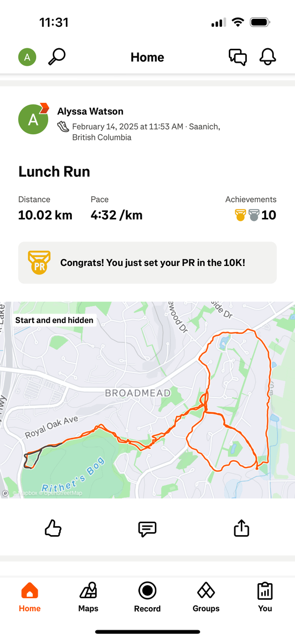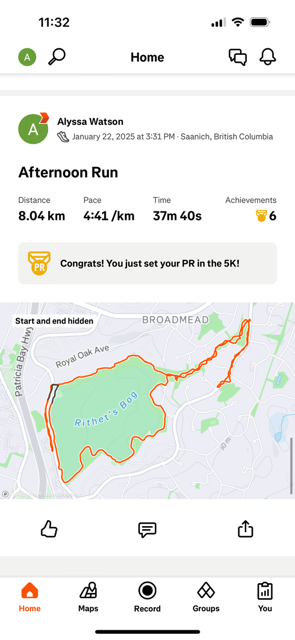What?
I have really been enjoying my half-marathon training. While there have been many rewarding moments, I have also encountered some challenges throughout this training journey. Starting with the positives, I’ve hit some personal records in my runs lately! This week, I ran 10km at a 4:32 per km pace. I also achieved a personal record in my 5km run. However, I’ve also faced some challenges. For example, I started to develop blisters on the bottom of my feet after doing long runs. Initially, I tried to put a blister bandaid over any hotspots to prevent further injury, but the bandaid would eventually fall off due to friction. This was frustrating because I had invested in a good pair of running shoes and quality pairs of running socks that are meant to prevent blisters from forming. To address this issue, I purchased a product from Amazon called FootGlide, an anti-chafe stick for feet. So far, I haven’t gotten any other blisters since using the product. Another challenge has been inconsistency in how I feel during my runs. There are days when I feel great and can run many kilometers over my planned length and other days when I feel sluggish and unmotivated. I’ve realized that, as discussed in my previous blog post, a lot of it has to do with my nutrition. If I eat too large of a meal before my run, I feel heavy and uncomfortable. If I have a lighter meal and ensure that I eat it at least 2 hours before I start my run, I feel so much better!
So What?
The sluggish feeling I have during some runs has reinforced the importance of pre-run preparation, particularly in terms of nutrition. I now understand that what I eat and when I eat has a significant impact on my performance, and I will make a conscious effort to eat proper foods at the right time to optimize my performance. Additionally, I’ve learned that not every run will feel great, and that’s okay. If it is hard, it should be. Some days will be harder than others because of many different factors, including hydration, sleep, nutrition, hormones, and many other factors. I shouldn’t let a “bad” run discourage me, as there are many things that could be contributing to this.
Now What?
Moving forward, I am going to be more strategic about my nutrition. I will plan it out so that I am eating at least 2 hours before my runs. I will try to write out a daily schedule for myself to help with this, ensuring I am highlighting when I will eat my pre-run meal and when I plan to do my run. Additionally. I want to continue to track how my body feels on different runs to identify patterns. By keeping notes on how much I eat, hydrate, and sleep, I can make better adjustments to improve my consistency. I need to remember that training involves lots of ups and downs. I don’t need to hit a personal record every time but should celebrate when I do!
Feature photo by Filip Mroz on Unsplash
Below are some screenshots of my latest runs, tracked on Strava:


